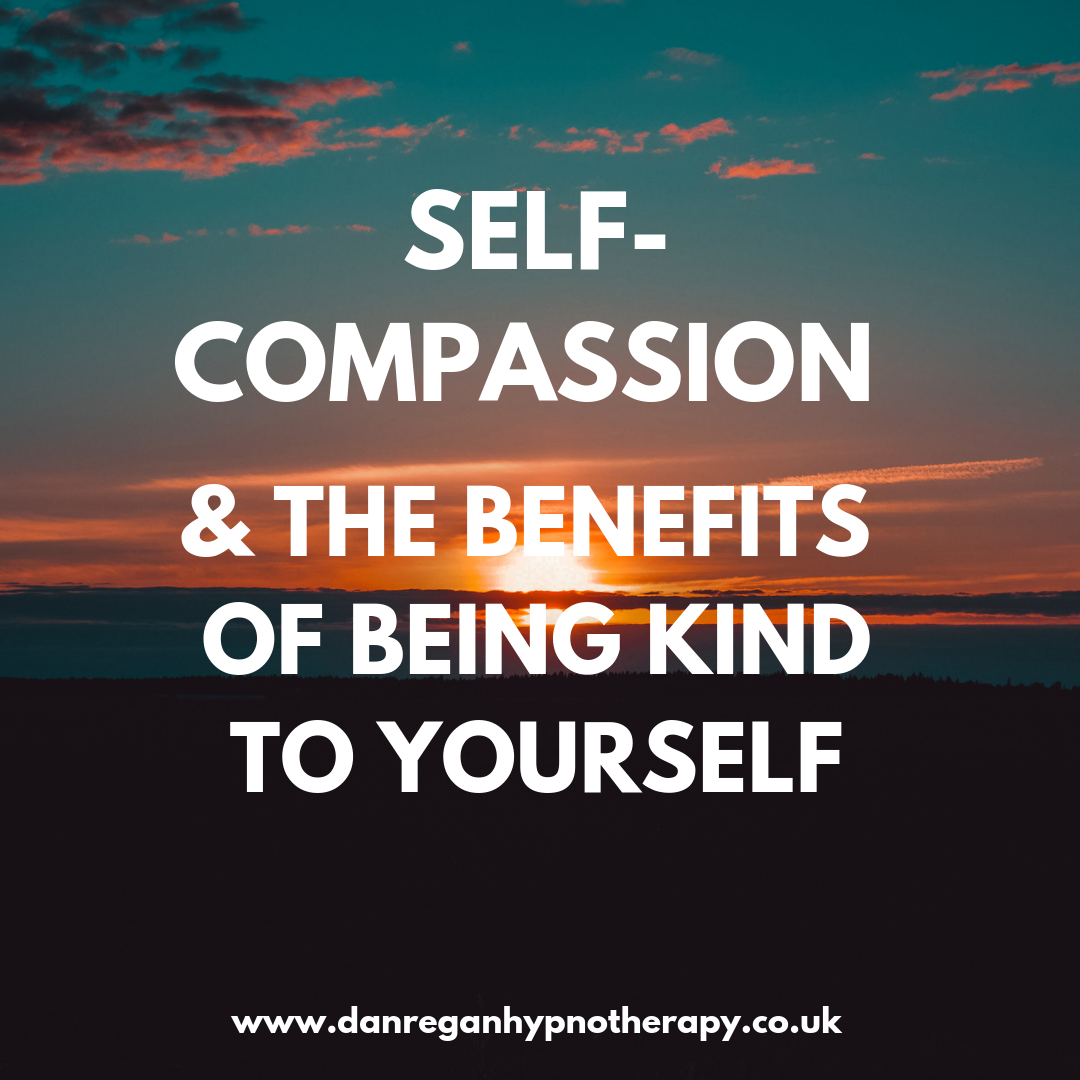Required
Why You Should Be Kind To Yourself – The Benefits of Self-Compassion
Why You Should Be Kind To Yourself – The Benefits of Self-Compassion
Do you find it easy and natural to be kind to yourself? Are you able to reassure yourself in times of adversity? Or perhaps you have a tendency to be self-critical, pointing out every perceived mistake you make and feeling like you don’t even like who you are.
I work with many people who have a habitual tendency to be harsh towards themselves and who judge themselves negatively. And it can be associated with many mental health problems such as anxiety, depression and low self-esteem. There are certainly few benefits to be gained, and not much respite to be had, from living your life being your own harshest critic.
That’s not to say that you need to strut about thinking that you are the best thing since sliced bread, yet being kind to yourself and exercising self-compassion has many benefits that mean you can encourage yourself, feel comfortable in your own skin and reassure yourself when dealing with challenges or adversity.
It can be easy, when things go wrong, or when faced with adversity or rejection, to turn the blame and criticism inwards and be harsh with yourself. However, a relatively recent piece of research has added to the study of the benefits of self-compassion which adds to the weight of knowledge about why you should be kind to yourself and develop self-compassion.
Of course one thing I encourage my own kids to do is to be kind to themselves (even if they can’t always be kind to each other!!). It’s so important, particularly when so much negative and potentially unhelpful stuff keeps coming their way (thankfully they are too young for all that Love Island stuff!).

Self-Compassion & Self-Criticism
We are all faced with all sorts of stresses, rejections, challenges and adversities as part of the human condition. Developing self-compassion can help you to use self-reassurance and self-soothing when these things come your way.
For example, recently I was nominated for a local awards thing by a client, who also nominated another therapist who had helped them at the same time as me. Despite my role in their recovery, the other therapist had their nomination progressed and mine was not. That’s the sort of rejection and circumstance that, when I struggled with anxiety and low self-esteem, would have been enough to send me into a spiral of negative self-criticism and feelings of frustration, worthlessness and misery.
In those days, I’d have criticised myself for not being good enough or for being a failure. I’d have used it to mentally chastise myself for being so rubbish and I’d have probably dragged out other examples that proved my negative view of myself. After all (I’d have told myself) I must be useless if they shortlisted the other person; I must be not as good as them.
These days my mindset is a little different. The nomination and judging process is something totally outside my control so there is no point sweating it. I’m just proud to have helped the person so much that they took the time to nominate me.
All of which brings us back to self-compassion, which has been defined as being kind to one’s self and being able to use self-reassurance and soothing in times of adversity. It includes being non-judgmental about yourself and recognising your experience as part of the human condition.
In contrast, self-negative (rumination), criticism involves being harsh and judgmental about one’s self and is associated with feeling isolated and exacerbating a sense of threat in difficult times. It’s been associated with many mental health problems, including anxiety and depression (self-compassion on the other hand has been associated with beneficial effects on mental health and well-being).
A 2019 study investigated the effect of two short-term self-compassion exercises compared to three control conditions of negative rumination, neutral and positive excitement. The aim of the study (Kirschner et al (2019), Soothing Your Heart and Feeling Connected: A New Experimental Paradigm to Study the Benefits of Self-Compassion) was to investigate the mechanisms by which self-compassion confers benefits.
The Benefits of Self-Compassion
Krischner et al (2019) investigated the effects of two short term self-compassion exercises. To account for potential differences in trait levels of self-compassion and self-criticism they had participants complete two questionnaires (both of which can be easily found online of you want to assess your own current levels of self-compassion and self-criticism).
The Self-Compassion Scale (Neff, 2003) is a 26 item questionnaire that asks you to consider how you typically act towards yourself in difficult times. It covers things such as whether you are disapproving and judgemental about your own flaws and inadequacies, and whether when you are feeling down you tend to obsess and fixate on everything that’s wrong. It also covers things like when things are going badly for you, whether you see the difficulties as part of life that everyone goes through and whether you are kind to yourself when you are experiencing suffering.
The Forms of Self-Criticising/Attacking & Self-Reassuring Scale (Gilvert et al.(2004)) looks at identifying different ways that people think and feel about themselves when things go wrong for them. It covers items such as whether you are easily disappointed with yourself, whether there is a part of you that puts you down or that feels you are not good enough, and whether you are able to remind yourself of positive things about yourself.
As mentioned, these two questionnaires are easily available online and provide really interesting clues and insight into whether you have a tendency to be self-critical and harsh towards yourself, or if you tend to keep perspective and keep a balanced view.
Each of the groups in the study were exposed to different interventions. The two short self-compassion exercises involved two processes. The first had participants direct kind and compassionate attention to their body sensations; the second had them bring to mind a person they felt a natural warmth towards and to direct friendly wishes toward this person, before offering the same friendly wishes towards themselves.
In the self-critical rumination group, they were asked to dwell on something they felt they had not managed or achieved as they would have wanted to (something that anyone who struggles with anxiety or depression may find sounds somewhat familiar). The control group were guided through a routine supermarket shopping scenario and the positive excitement group were asked to think about a positive event or situation or achieving something great.
Perhaps unsurprisingly the researchers found that “Increased self-reported-state self-compassion, affiliative affect, and decreased self-criticism were found after both self compassion exercises and the positive-excitement condition. However, a psychophysiological response pattern of reduced arousal (reduced heart rate and skin conductance) and increased parasympathetic activation (increased heart rate variability) were unique to the self-compassion conditions. This pattern is associated with effective emotion regulation in times of adversity. As predicted, rumination triggered the opposite pattern across self-report and physiological responses“.
Thus self-compassion leads to positive effects on mental and physical health and can be practiced and developed fairly easily (for example, using the two brief exercises used in this study).
How Self-Compassion Delivers Benefits
The researchers have suggested two possible ways that self-compassion may help boost mental health and counter anxiety and depression tendencies.
One way suggested may be that self-compassion activated the parasympathetic system which is associated with stress reduction, social affiliation and effective emotional regulation. So that instead of a fight or flight, or heightened threat and stress response, self-compassion may induce a relaxed physiological state, which has been linked to a healthy tolerance for distress and a motivation to care for yourself and others.
It may also be that self-compassion increases positive self and decreases negative self and so addresses cognitive vulnerabilities for mental health problems such as anxiety and depression (“Short-term self-compassion exercises may exert their beneficial effect by temporarily increasing positive self and reducing negative self-bias, thus potentially addressing cognitive vulnerabilities for mental disorders”).
Both of the self-compassion exercises temporarily activated a more positive (self-compassion) and less negative self (self-criticism) and that positive self has been associated with higher levels of well-being. It also counters some cognitive tendencies for anxiety and depression mental health issues where someone may automatically be negative, judgemental and harsh towards themselves and disregard more positive information about themselves.
And as Kirschner et al conclude, “We conclude that self-compassion reduces negative self bias and activates a content and calm state of mind with a disposition for kindness, care, social connectedness, and the ability to self-soothe when stressed.”
Adopting Self-Compassion
With all the positive research suggesting mental health benefits, it really does make sense to start adopting self-compassion exercises into your daily routine. Being negative, harsh and judgemental towards yourself leads to unhappiness, reduced satisfaction with your life and can feed into low self-esteem, anxiety and depression issues.
Rather than getting down on yourself and exacerbating whatever you are facing, being kind to yourself can help you to handle challenges, to be more calm and positive in your mindset and to recognise that whatever you are facing is part of the human condition that each and everyone of us experiences at some time or other. Being kind to yourself can help you to more effectively deal with set-backs, challenges and adversity in a way that can make your mental health stronger.
There are many hypnosis, meditation and mindfulness practices that support being kinder to yourself and promoting self-compassion. Or you could adopt the exercises used in the research (directing kind and compassionate attention to your bodily sensations or bringing to mind a person you feel a natural warmth towards and then direct friendly wishes toward this person before offering the same friendly wishes towards yourself).
To your success,
Dan Regan
Hypnotherapy in Ely & Newmarket
If you could use some help to start being kinder to yourself and to feel comfortable in your own skin then come along for a free consultation. You can book your Complimentary Hypnotherapy Strategy Session with Dan now: Appointments
Interested in what other people have said after their hypnotherapy sessions with Dan? Learn more here: What People Say
And check out these powerful hypnosis downloads that can start helping you right away: Hypnosis Downloads
References:
Kirschner, Hans, Willem Kuyken, Kim Wright, Henrietta Roberts, Claire Brejcha, and Anke Karl. “Soothing Your Heart and Feeling Connected: A New Experimental Paradigm to Study the Benefits of Self-Compassion.” Clinical Psychological Science (2019): 2167702618812438.
Neff, K. D. (2003). Development and validation of a scale to measure self-compassion. Self and Identity, 2, 223-250.
Gilbert, P., Clark, M., Hempel, S., Miles, J.N.V. & Irons, C. (2004). Criticising and reassuring oneself: An exploration of forms, styles and reasons in female students. British Journal of Clinical Psychology, 43, 31-50.
Get Your Copy Right Now…
Subscribe to Dan’s Digest filled with tips, strategies and techniques and get instant access to your free rapid relaxation hypnosis audio track.
Enjoy feeling and being more mentally calm and physically relaxed right now:





0 Comments